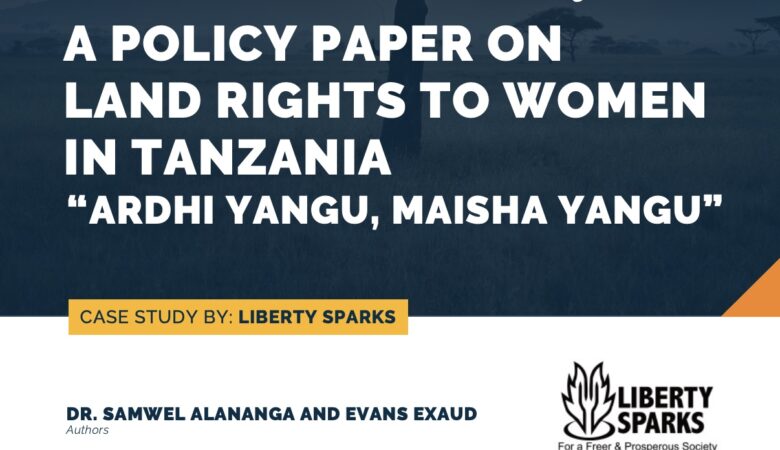Interview with Dr. Samwel Sanga Alananga on Women’s Property Rights in Tanzania
SAMWEL SANGA ALANANGA (Ph.D.) is currently a research consultant for Liberty Sparks, a think tank dedicated to individual liberty, free market philosophy, and entrepreneurship throughout Africa. Dr. Alananga’s research centers on Geo-analytics in Economics and Business. His most recent research topics include asymmetric property markets and applied Geo-spatial science in sectors such as housing, human settlements, agricultural and forest economics, urban economics, as well as in property rights. Dr. Alanangahas published extensively in internationally recognized journals and has carried out research at SIDA, the Bank of Tanzania, Ifakara Health Institute, Local Investment Climate (LIC), IREBS Foundation for African Real EstateResearch, and the Export Processing Zone Authority. His most recent case study is entitled “A policy paper on Land Rights to Women in Tanzania.”
What is the mission of your institute?
Liberty Sparks is the most active think tank in Tanzania with the mission of promoting Liberty, Free Market Economics, and Entrepreneurship. With that in mind, Liberty Sparks has spearheaded movements for enhancing adjudication of land rights to all rightful holders, including women throughout Tanzania by means of awareness campaigns, documentaries, and the dissemination of research findings.
What has your institute done to promote property rights?
As a think tank, Liberty Sparks has carried out research and written articles that are published on our website and other platforms. The think tank also translates books related to free market economics and entrepreneurship into Kiswahili, so that they reach a wider audience throughout East and Central Africa. Liberty Sparks is now geared towards policy changes ensuring that research findings influence policy and decision making in the country. Hence, Liberty Sparks has carried out a number of grassroots awareness campaigns in several regions where people are unaware of the legal provisions that protect their property rights, unlawful eviction, and the infringement of their rights. Liberty Sparks has also formed a coalition with other think tanks or associations involved in land rights in order to facilitate a nationwide discussion., setting lobbying strategies, and carrying out our massive awareness campaign on land rights. Through this platform, Liberty Sparks has carried out more than three stakeholder meetings – to disseminate research findings. As part of an awareness campaign, Liberty Sparks has prepared a documentary on the plight of women regarding their land rights in a campaign famously known as “My Land, My Right, My Life”.
What needs to be done to ensure the protection of land rights for women?
The initiatives to enhance women’s land rights in Tanzania are more linked to awareness of what rights one has and what one can or cannot do on the land. Researchers have clearly demonstrated that women who are bold enough to channel their land rights grievances through legal procedure end up being successful despite facing serious socio-cultural stigma and other types of harassment. This is specifically the case for land on the property of a clan or family. As regards private land, such differentiation between men and women is not evident. We wish to advocate for the process of individualization of land in rural areas which is synonymous with defining private property rights even if land rights in Tanzania do not mean a definitive ownership. As part of Liberty Sparks’ endeavors to promote free market economies, private land is the tool to promote transactions and enhance ownership of land.
What progress has your institute made on equal gender rights, namely women’s rights?
Liberty Sparks has been successful in providing awareness to many people regarding their land rights. There are cases when individuals were given assistance in accessing justice and exercising their rights. Research reports suggest that the movement on women’s land rights is still in the preliminary stages, and we have a lot to do to rescue millions of women who suffer humiliation and abuse simply because they lack land ownership rights despite their use and holding land. Standing united, our collaborations with other think tanks and associations will certainly break ground – the government will have no option, but to hear the plight of women and invest in enhanced awareness campaigns via different platforms.

